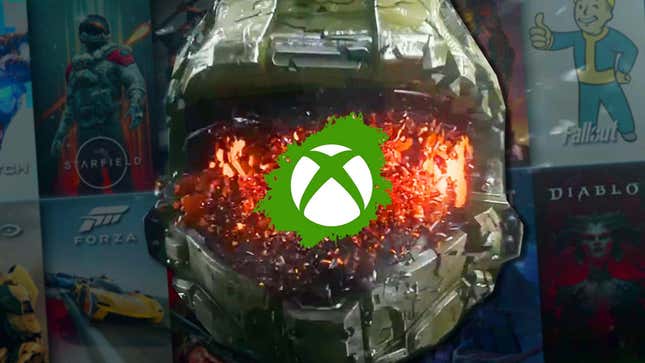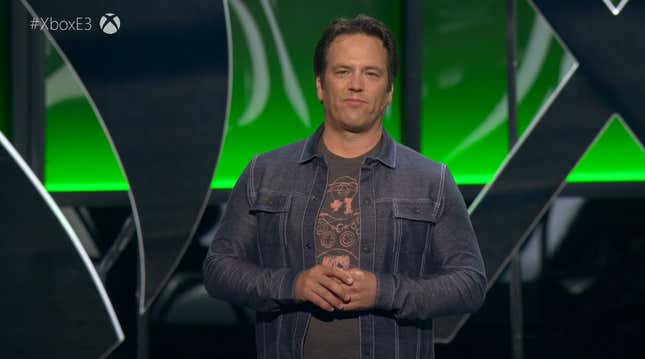
“Xbox launching without exclusives is so crazy, it just might work,” read one headline from November 2020. It did not. While the PlayStation 5 rang in the holiday that year with Spider-Man: Miles Morales and the Demon’s Souls remake, the Xbox Series X/S was huddled up alongside next-gen upgrades for games everyone had already played. No single event can make or break a console, but it was an opening misfire that now fits an all-too-well-established pattern of Xbox dropping the ball when it matters most.
The first notable exclusives for the Xbox Series X/S didn’t arrive until the following summer with Microsoft Flight Simulator followed in the fall by Forza Horizon 5. They were nice side dishes but no grilled steak. Everyone appreciates a good potato salad or baked mac, but that’s not why they show up to the BBQ. It has been this way with Xbox for over a decade now.
There’s no shortage of great games but few are exclusive and none of them—not Forza, not Halo, not Starfield—have popped like the biggest exclusive blockbusters on PS5. Unable to conjure a killer app, it’s tried to buy them, starting with Minecraft, but the result is now that the most compelling parts of Microsoft’s portfolio are all available elsewhere.
If a family member, friend, or some stranger at GameStop asked me if they should get an Xbox, my answer would look like a spreadsheet full of if/then functions. The value proposition of Game Pass remains strong but increasingly mired in asterisks. Genre diversity abounds and there’s early console access to some of the biggest Steam hits around. There is something for everyone on Xbox if they know how, where, and when to look. My answer for whether to get a PS5 would be much simpler: Horizon Forbidden West, God of War Ragnarok, Spider-Man 2, a dozen remasters of The Last Of Us.
These are not the types of games everyone buys a $500 machine for, but they are definitely the types of games a particular kind of person might buy a $500 machine for. The type of person who buys relatively few games—a yearly Madden update and the new Grand Theft Auto—but doesn’t really discriminate between genres and has no franchise loyalty. They want the big, cinematic blockbuster with a gameplay hook just meaty enough to be fun but not so complex it starts to feel like work. These are the types of games that often win Game of the Year at Geoff Keighley’s Game Awards, and they just happen to be the type Sony spent the PS4 generation specializing in.

They are also the type Xbox currently feels constitutionally incapable of shipping. The Xbox One is still haunted by the cancellation of Scalebound, Bayonetta designer Hideki Kamiya’s fantasy action-RPG meant to bring some variety to the platform’s traditionally shooter-centric lineup of exclusives. The recently killed Perfect Dark reboot now feels like that for the Xbox Series X/S generation. It was a highlight at the 2024 Xbox summer showcase and now it’s canceled, despite Microsoft studios head Matt Booty saying he was excited by what he’d played back in 2023. A new Fable, first revealed before the Xbox Series X/S launched, remains a year out.
The Xbox 360 surged to prominence thanks in part to Bungie’s Halo and Epic Games’ Gears of War. Neither franchise has been the same under Microsoft’s in-house teams. That might be part of why the company keeps acquiring new ones rather than trying to build them itself. But the results have been just as uneven. “If that were the only reason for this wave of cancellations and layoffs, it would be a terrible shame, but a rational reality,” Polygon’s Oli Welsh wrote last week. “But the darker cloud hanging over the story is that Microsoft has—consistently and repeatedly, over decades—shown it has no aptitude for running the creative industry it just bought half of.”
A year before he began laying off thousands of staff across Xbox’s now-sprawling empire of studios and publishers, Phil Spencer suggested Xbox’s fate was set in stone. The Xbox One generation was too disastrous to recover from. Players were now locked in. He called it “[the] worst generation to lose.” That logic paved the way for Microsoft’s pivot away from hardware and toward becoming a third-party publishing platform hitched to subscription and cloud gaming. “There is no world where Starfield is an 11/10 and people start selling their PS5s,” he said in 2023. “That’s not going to happen.” But Starfield wasn’t an 11/10 or even a 9/10, so we’ll never quite know. It was a convenient time for the quality of exclusives to stop mattering.
Having watched the Switch cruise to being the second best-selling console of all time purely on the back of first-party exclusives like The Legend of Zelda: Breath of the Wild, Animal Crossing: New Horizons, and Mario Kart 8 Deluxe, I’m not convinced that the games don’t matter. When Google shut down its first-party studios in 2021, the developers there asked their boss at the time, Jade Raymond, what that meant for the rest of Stadia, the company’s cloud gaming platform. According to sources present at the time, she said something along the lines of “no gaming platform has ever succeed without strong first-party games.” If you build it, they might come. If you stop, they definitely won’t.
“I’m proud to introduce the creation of a brand new Microsoft studio, The Initiative, led by Darrell Gallagher, a visionary storyteller who has worked across some of the most iconic franchises for over 20 years,” Spencer said back at E3 2018. “This new Santa Monica studio is building a team of world-class talent to create groundbreaking new game experiences.” It was a play for GOTY blockbusters right in PlayStation’s first-party backyard. The Initiative would have “the resources, the platform, and the creative independence to take bigger risks and create even bolder worlds.” Apparently the risks were too big and the worlds were taking too long.
Correction 7/7/2025 3:04 p.m.: Psychonauts 2 came day-and-date to PS5 as well as Xbox Series X/S.
.